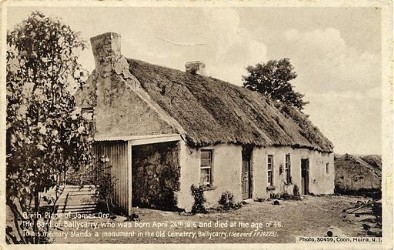war - Sligo Poets
Main menu:
- Home
-
1912
- 1912
- Sligo Poetry 1912
-
1913
- 1913
- Sligo Poetry 1913
-
1914
- 1914
- Sligo Poetry 1914
-
1915
- 1915
-
Sligo Poetry 1915
- Sligo Newspaper Poems
- Sligo Champion
- Sligo Independent
- Sligo Nationalist
-
1916
- 1916
-
Sligo Poetry 1916
- Sligo Newspaper Poems 1916
- Sligo Champion
- Sligo Nationalist
- Sligo Independent
- The Poets
- Bibliography
- The Author

Sligo Nationalist 7 November 1914.
The Irishman
(Orr, popularly called "The Poet of Ballycarry," a village between Carrickfergus and Larne, was originally a journeyman weaver. He first appeared before the public as one of the poetical contributors to the "Northern Star" – the organ of the United Irishmen. In 1798 he was engaged in the Battle of Antrim, after the fatal issue of which, he emigrated to America, where, however, he remained but a short time, and then returned to his native village, where he dies on the 24 th April, 1816.)
The savage loves his native shore,
Though rude the soil and chill the air;
Well then may Erin's sons adore
Their isle, which nature formed so fair!
What flood reflects a shore so sweet,
As Shannon great, or pastoral Bann?
Or who a friend or foe can meet,
So generous as an Irishman?
His hand is rash, his hart is warm
But honesty is still his guide;
None more repents a deed of harm,
And none forgives with nobler pride;
He may be duped, but won't be dared—
More fit to practice than to plan;
He dearly earns his poor reward,
And spends it like an Irishman.
If strange or poor, for you he’ll pay,
And guide to where you safe may be;
If you're his guest, while e'er you stay,
His cottage holds a jubilee.
His inmost soul he will unlock,
And if he may your secrets scan,
Your confidence he scorns to mock,
For faithful is an Irishman.
By honour bound in woe or weal,
Whate'er she bids he dares to do;
Try him with bribes—they won’t prevail,
Prove him in fire—you'll find him true.
He seeks not safety, let his post
Be where it ought, in danger's van:
And if the field of fame be lost,
It won’t be by an Irishman.
Erin! loved land! From age to age,
Be thou more great, more famed and free;
May peace by thine, or, shouldst thou wage
Defensive war, cheap victory!
May plenty bloom in every field
Which gentle breezes softly fan,
And cheerful smiles serenely gild,
The home of every Irishman!
James Orr

Sligo Nationalist 19 December 1914.
Our Fallen Braves
Let them rest quietly, there on the field
Where they fell fighting but never would yield,
Where their great spirits heard Heaven’s great call
Bravely to conquer or bravely to fall.
Let not a lip drop a sorrowful word,
Let not a note of lamenting be heard,
Great was their mission, sublime was their end;
Liberty’s honour and life to defend.
Shielded for aye from the Hun’s savage lust,
Love rears its monument over their dust,
Radiant with glory no spoiler may spoil,
Baffling the fingers that touch but to soil.
Voices shall sing in the days yet to be
Songs they made possible, songs of the free.
Earth wear a beauty their blood for us bought
Where they defended the soil of True Thought.
Tell to your children the tale of their deed,
Sow in their soul the unperishing seed.
Bid them their all in the same manner give,
So length’ning the roll of the names that will live.
Screened by Heaven’s infinite light-
Let them lie quietly, loved by us all,
Sleeping the sleep of the noble who rest,
After enduring the test of the best.
GEORGE A. SUTTLE.
These two poems, published towards the end of 1914 make a strange combination and reflect the fact that attitudes to the war and Ireland's role in it had not yet hardened polarised to the entrenched posirions of 1916 and after.
The poem by James Orr, written by a member of the revolutionary United Irishmen who took part in the 1798 rebellion, celebrates Ireland and the Irish and contains little that might be interpreted as support for the war. Perhaps these lines could be: "He seeks not safety, let his post/ Be where it ought, in danger's van:/And if the field of fame be lost,/ It won’t be by an Irishman" but the lines "May peace by thine, or, shouldst thou wage/ Defensive war, cheap victory!" could hardly be seen as an exhortation to join the war. BBC programme about James Orr.
The other poem appears to have been locally written locally. The phrase "our fallen braves" was a common way of referring to those killed in war. The poem seems a standard of its kind with the usual praise for the actions of those killed, assurance that their deaths have not been in vail, that those left behind will benefit from the death, that the dead will always be remembered and appreciated and that they fought on the side of right. It also has a reference to the standard depiction of the enemy at the time: "the Hun’s savage lust".
The only George Suttle in Ireland in the 1911 Census appears to be a 18 year old living in Drumany, Kilmore, County Fermanagh. He was a Church of Ireland member and his father was an English-